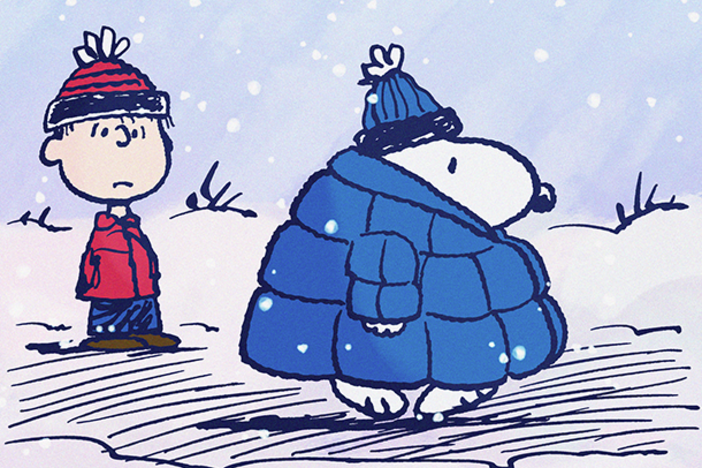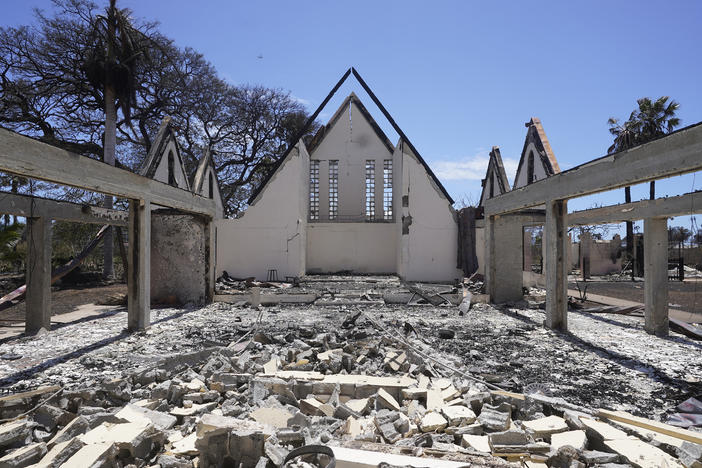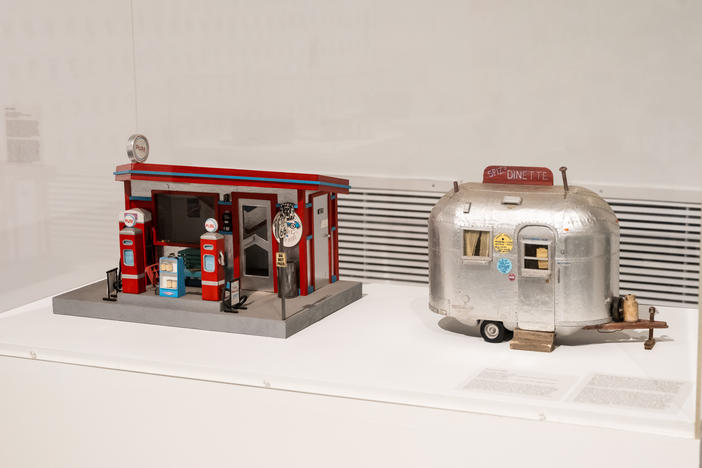Section Branding
Header Content
Dispatches From Quarantine: How Young People Are Documenting History
Primary Content
Enticed by what young adults had to share about the pandemic, historian Alexandra Zapruder set out to document history through an online gallery called Dispatches from Quarantine.
Transcript
STEVE INSKEEP, HOST:
A historian wants kids to document some of the history they've been living through. Alexandra Zapruder has been running a project inviting students to send in diary entries during the pandemic.
(SOUNDBITE OF MONTAGE)
FIONA DONG: I worried about my family every day.
KATRINA HOOK: I'm really tired of the world ending.
SAM KOFMAN: I'm really sick of this.
JACK TRAPANICK: If I go out on unnecessary trips, does that make me a bad person?
KYLIE MASSER: I lose myself in daydreams so as to not lose myself in panic.
CLAIRE HAMMOND: I don't know what comes next.
IRIN SHIM: Nobody seems to know what is going on.
SAM: The only human interaction I have is with my family.
INSKEEP: Those are some of the students who took part in Alexandra Zapruder's project, Dispatches from Quarantine: Young People on COVID-19.
ALEXANDRA ZAPRUDER: We began the project back in April of 2020, shortly after we all went into quarantine. With the proliferation of social media, I started to think about how diaries have basically been supplanted. And what's a little bit been lost is the kind of quiet reflection, the authentic preservation of experiences that are captured in diaries.
(SOUNDBITE OF MONTAGE)
MASSER: I go outside to forget about what's going on outside of my clean white fence.
TRAPANICK: Now, though, to go out is largely viewed as a selfish act, one which puts our own desire for a little happiness over the safety of all.
SAM: It's really sad that people can't celebrate their birthdays with their friends. My birthday's coming up relatively soon, and I'm a bit worried.
ZAPRUDER: You know, of course, young people write about what you expect that they would write about. Some of them wrote about missing school or about missing out on prom or the regular kinds of things that one would expect.
(SOUNDBITE OF ARCHIVED RECORDING)
HOOK: I know it's dumb to be focused on hoping we get to be back in school in the fall and have a cross-country season when thousands of people are dying.
ZAPRUDER: But there's so much that is unexpected. And one of the things that came up again and again and again was the way that young people experienced the quarantine as a kind of reprieve from their daily life.
(SOUNDBITE OF ARCHIVED RECORDING)
HAMMOND: I can hear the birds chirping all the time now. I never used to listen to the birds before, too busy running around from activity to activity.
ZAPRUDER: Which has this effect of reminding us how much pressure teens are under. And it's not because they said I'm under pressure. It's because they said for the first time I get to breathe. You know, there's this one beautiful entry with a young writer saying...
(SOUNDBITE OF ARCHIVED RECORDING)
HAMMOND: For the first time in such a long while, I've been able to just stop and sit. I've been able to focus on myself and heal a bit in a world so broken.
ZAPRUDER: Certainly, there is a lot of fear. These entries really captured the immediacy of that fear and the helplessness. You know, young people are at the mercy of their parents and the decisions that they're making. And so they're not always feeling safe because they're not making their own choices.
(SOUNDBITE OF ARCHIVED RECORDING)
MAIA SIEGEL: I was ill until proven healthy. My mother left me small foods laid on paper plates on the stairs, running away as I came out.
ZAPRUDER: Maia Siegel's poem was one of the first that came in, and I - it knocked me out. She writes about the tension in her family because she's in quarantine, and her mother is sort of freaking out about her own safety.
(SOUNDBITE OF ARCHIVED RECORDING)
SIEGEL: I despised her for being so scared of me, for crying to the doctor, if she comes down, I will feel panicked. I did not come down. I stayed still for six days, four of which I did not get out of bed.
ZAPRUDER: Lots of kids wrote about how they were reconnecting with their families...
(SOUNDBITE OF ARCHIVED RECORDING)
TRAPANICK: I've been playing board games like Monopoly with my family. My mom's been crushing us.
ZAPRUDER: ...And how they were so happy to get to spend time with their parents or their siblings, which is not something that we would necessarily expect.
(SOUNDBITE OF ARCHIVED RECORDING)
TRAPANICK: We video-called with my nana this weekend, something I would never have believed I'd do in my lifetime.
ZAPRUDER: The other area that definitely comes up in a number of entries is about Asian American hate. This is true in the reflection of Irin Shim, who writes very, very powerfully about, you know, a casual joke that was very hurtful to her.
(SOUNDBITE OF ARCHIVED RECORDING)
SHIM: My best friend asked if my mom is cooking a bat for dinner. Ha ha, didn't laugh. It's just a joke.
ZAPRUDER: Young people, you know, we forget just how astute they are and just how much they're seeing and taking in of the world around us.
(SOUNDBITE OF ARCHIVED RECORDING)
SHIM: Every day, I am dismayed by what I find, disappointed in my country and infuriated that such attacks are not reprimanded by the public.
ZAPRUDER: We were so glad to have such a wide range of experiences, someone like Fiona Dong, who was going to school in Massachusetts and was called to return home to China...
(SOUNDBITE OF ARCHIVED RECORDING)
DONG: I still clearly remember when the corona outbreak happened in China. I checked the data on the number of cases every morning after I woke up.
ZAPRUDER: ...And so wrote at length about her journey back home.
(SOUNDBITE OF ARCHIVED RECORDING)
DONG: The airline stewardess gave us some food and drinks packed in a plastic bag. She told us not to eat at the same time as our neighbor and that it was the only meal that they would serve on this flight. Thank you. Thinking of the risk that I needed to take for eating that food, I gave up.
ZAPRUDER: Too scared to eat on the plane and then two weeks by herself in a hotel room, you know, and we want to and need to preserve those little details because that's the texture of daily life. That's the stuff we're going to forget 20 years from now. We were very conscious to say, you know, if you want to write what is the equivalent of a diary entry, that's great. But we'll take anything. We'll take poetry. We'll take art, photography. So we got a lot of different things. And we got a wonderful song by a young girl named Naiobi Benjamin who wrote about all the things that she was missing while she was in quarantine.
(SOUNDBITE OF VIDEO)
NAIOBI BENJAMIN: (Singing) I think of what we planned and how now everything has changed. And I guess I understand how it fell apart and you didn't try to fix it then.
ZAPRUDER: I think that this project confirmed what I believe so deeply, which is that what young people have to say about their lives really matters and that there are young people who want to observe, describe and reflect upon their experiences. They want to contribute to the historical and literary record. You know, I'm a big believer in the need for an archive that really preserves those kinds of records for the benefit of all of us.
(SOUNDBITE OF VIDEO)
BENJAMIN: (Singing) I'm scared of starting over. I need a four-leaf clover to wish a happy ending because why are we pretending that everything will be all right?
INSKEEP: Alexandra Zapruder is the curator of an online gallery called Dispatches from Quarantine. And the students you just heard are...
SIEGEL: Maia Siegel.
HAMMOND: Claire Hammond.
SAM: Sam Kofman.
TRAPANICK: Jack Trapanick.
DONG: Fiona Dong.
MASSER: Kylie Masser.
HOOK: Katrina Hook.
SHIM: Irin Shim.
BENJAMIN: Naiobi Benjamin.
(SOUNDBITE OF VIDEO)
BENJAMIN: (Singing) And I don't want to be alone but I know I'm safe at home. I want to run. I want to cry. I want to fight and stay alive. Transcript provided by NPR, Copyright NPR.
Bottom Content



